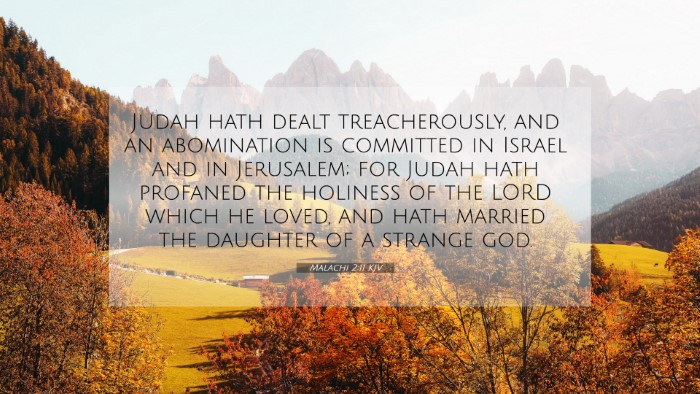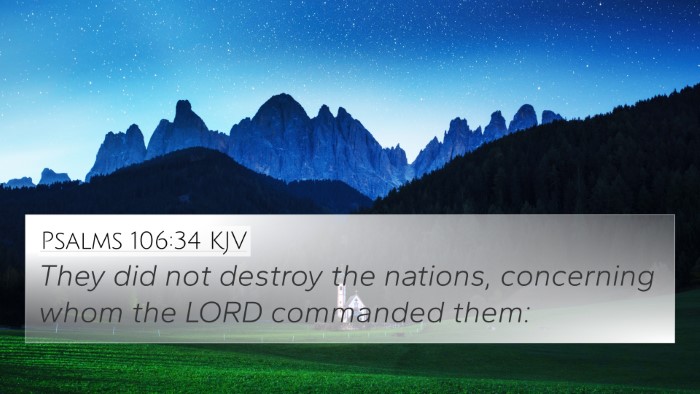Old Testament
Genesis Exodus Leviticus Numbers Deuteronomy Joshua Judges Ruth 1 Samuel 2 Samuel 1 Kings 2 Kings 1 Chronicles 2 Chronicles Ezra Nehemiah Esther Job Psalms Proverbs Ecclesiastes Song of Solomon Isaiah Jeremiah Lamentations Ezekiel Daniel Hosea Joel Amos Obadiah Jonah Micah Nahum Habakkuk Zephaniah Haggai Zechariah MalachiMalachi 2:11 Similar Verses
Malachi 2:11 Cross References
Judah hath dealt treacherously, and an abomination is committed in Israel and in Jerusalem; for Judah hath profaned the holiness of the LORD which he loved, and hath married the daughter of a strange god.
Uncover the Rich Themes and Topics of This Bible Verse
Listed below are the Bible themes associated with Malachi 2:11. We invite you to explore each theme to gain deeper insights into the Scriptures.
Malachi 2:11 Cross Reference Verses
This section features a detailed cross-reference designed to enrich your understanding of the Scriptures. Below, you will find carefully selected verses that echo the themes and teachings related to Malachi 2:11 KJV. Click on any image to explore detailed analyses of related Bible verses and uncover deeper theological insights.
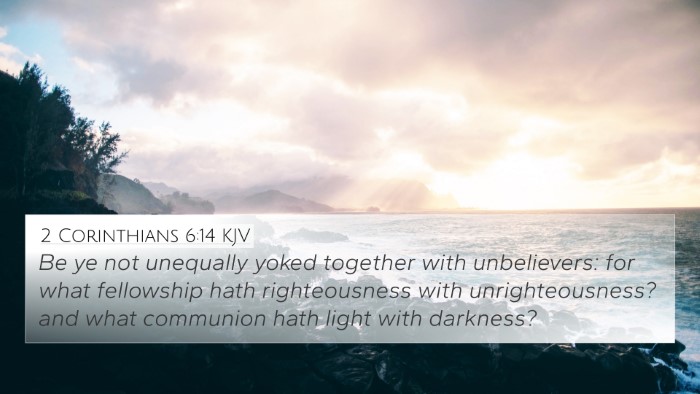
2 Corinthians 6:14 (KJV) »
Be ye not unequally yoked together with unbelievers: for what fellowship hath righteousness with unrighteousness? and what communion hath light with darkness?
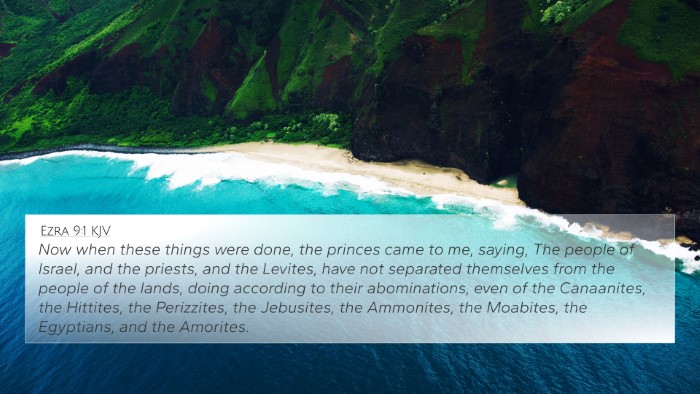
Ezra 9:1 (KJV) »
Now when these things were done, the princes came to me, saying, The people of Israel, and the priests, and the Levites, have not separated themselves from the people of the lands, doing according to their abominations, even of the Canaanites, the Hittites, the Perizzites, the Jebusites, the Ammonites, the Moabites, the Egyptians, and the Amorites.
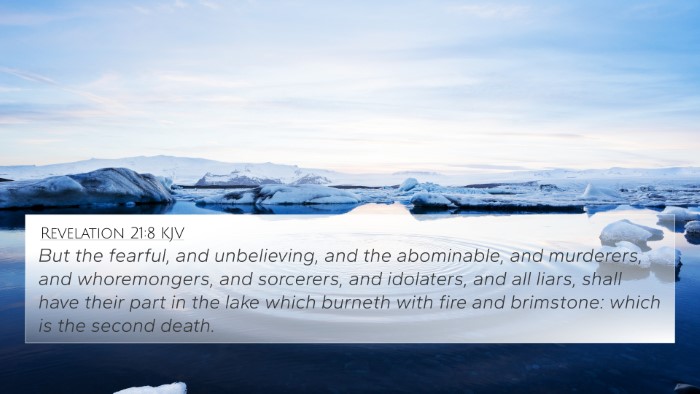
Revelation 21:8 (KJV) »
But the fearful, and unbelieving, and the abominable, and murderers, and whoremongers, and sorcerers, and idolaters, and all liars, shall have their part in the lake which burneth with fire and brimstone: which is the second death.

Psalms 106:28 (KJV) »
They joined themselves also unto Baalpeor, and ate the sacrifices of the dead.

Jeremiah 3:7 (KJV) »
And I said after she had done all these things, Turn thou unto me. But she returned not. And her treacherous sister Judah saw it.

Jeremiah 2:21 (KJV) »
Yet I had planted thee a noble vine, wholly a right seed: how then art thou turned into the degenerate plant of a strange vine unto me?
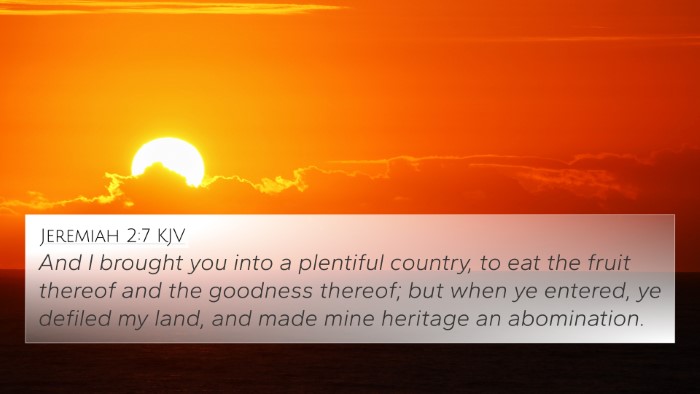
Jeremiah 2:7 (KJV) »
And I brought you into a plentiful country, to eat the fruit thereof and the goodness thereof; but when ye entered, ye defiled my land, and made mine heritage an abomination.
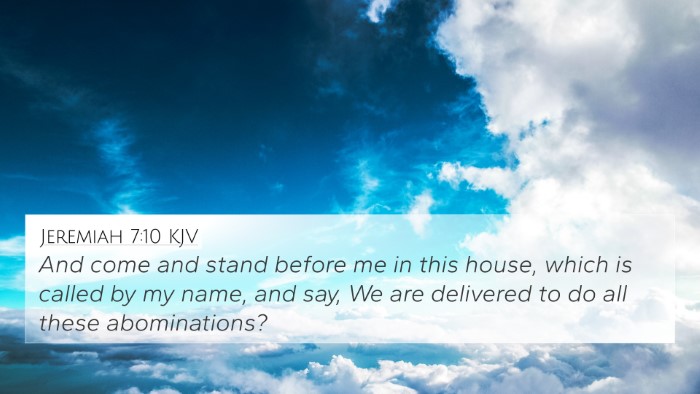
Jeremiah 7:10 (KJV) »
And come and stand before me in this house, which is called by my name, and say, We are delivered to do all these abominations?
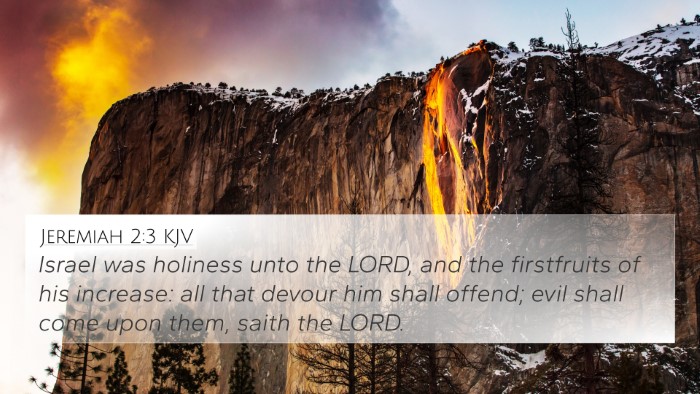
Jeremiah 2:3 (KJV) »
Israel was holiness unto the LORD, and the firstfruits of his increase: all that devour him shall offend; evil shall come upon them, saith the LORD.
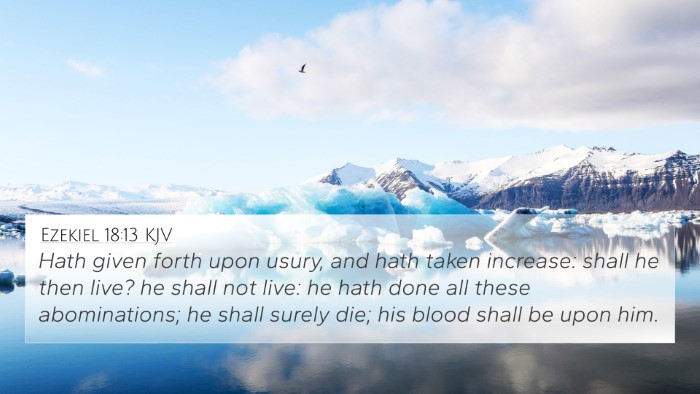
Ezekiel 18:13 (KJV) »
Hath given forth upon usury, and hath taken increase: shall he then live? he shall not live: he hath done all these abominations; he shall surely die; his blood shall be upon him.

Ezekiel 22:11 (KJV) »
And one hath committed abomination with his neighbour's wife; and another hath lewdly defiled his daughter in law; and another in thee hath humbled his sister, his father's daughter.
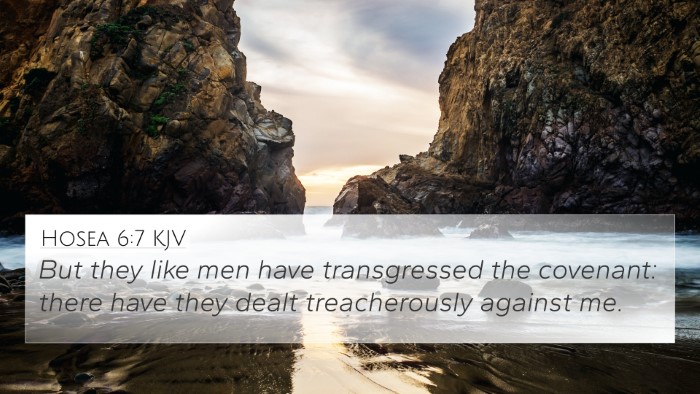
Hosea 6:7 (KJV) »
But they like men have transgressed the covenant: there have they dealt treacherously against me.

Nehemiah 13:23 (KJV) »
In those days also saw I Jews that had married wives of Ashdod, of Ammon, and of Moab:
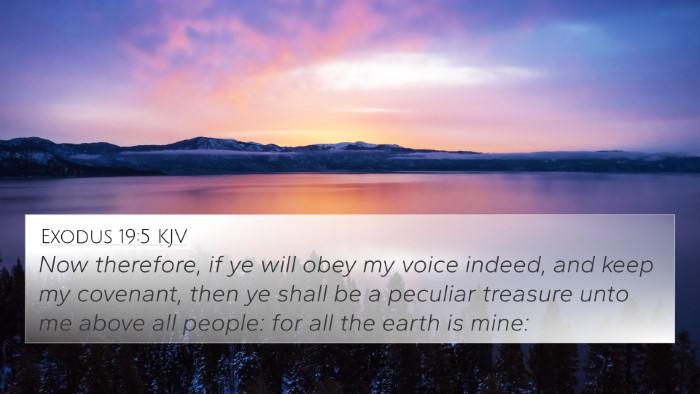
Exodus 19:5 (KJV) »
Now therefore, if ye will obey my voice indeed, and keep my covenant, then ye shall be a peculiar treasure unto me above all people: for all the earth is mine:

Leviticus 18:24 (KJV) »
Defile not ye yourselves in any of these things: for in all these the nations are defiled which I cast out before you:

Leviticus 20:26 (KJV) »
And ye shall be holy unto me: for I the LORD am holy, and have severed you from other people, that ye should be mine.
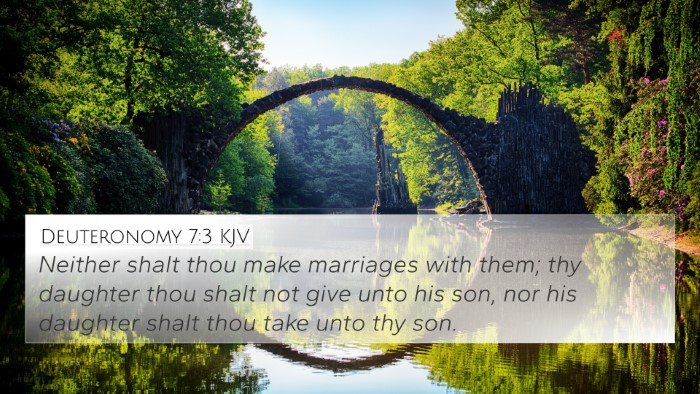
Deuteronomy 7:3 (KJV) »
Neither shalt thou make marriages with them; thy daughter thou shalt not give unto his son, nor his daughter shalt thou take unto thy son.

Deuteronomy 33:26 (KJV) »
There is none like unto the God of Jeshurun, who rideth upon the heaven in thy help, and in his excellency on the sky.

Deuteronomy 14:2 (KJV) »
For thou art an holy people unto the LORD thy God, and the LORD hath chosen thee to be a peculiar people unto himself, above all the nations that are upon the earth.
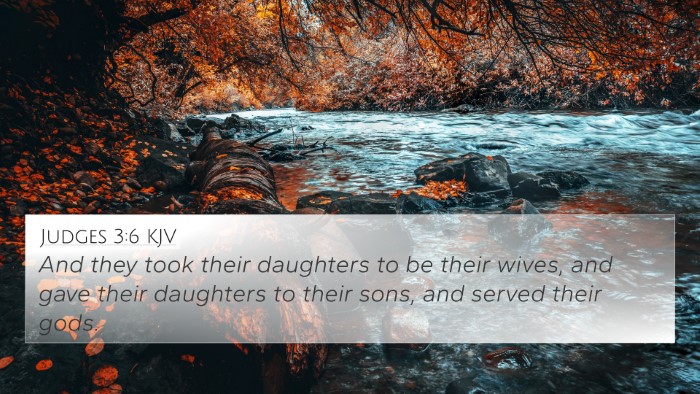
Judges 3:6 (KJV) »
And they took their daughters to be their wives, and gave their daughters to their sons, and served their gods.
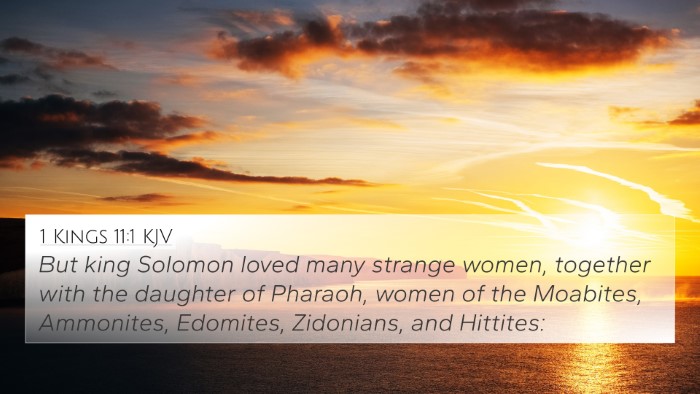
1 Kings 11:1 (KJV) »
But king Solomon loved many strange women, together with the daughter of Pharaoh, women of the Moabites, Ammonites, Edomites, Zidonians, and Hittites:
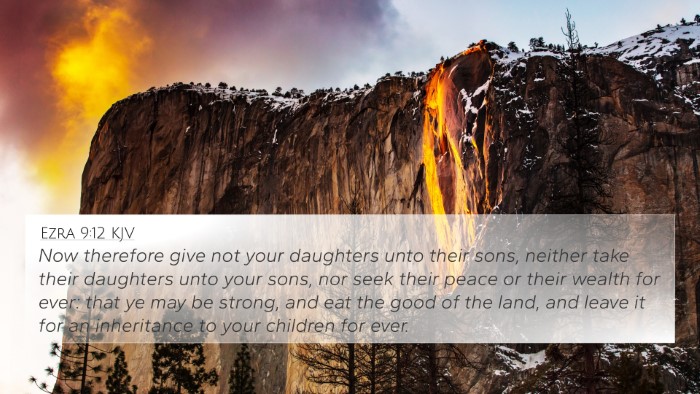
Ezra 9:12 (KJV) »
Now therefore give not your daughters unto their sons, neither take their daughters unto your sons, nor seek their peace or their wealth for ever: that ye may be strong, and eat the good of the land, and leave it for an inheritance to your children for ever.
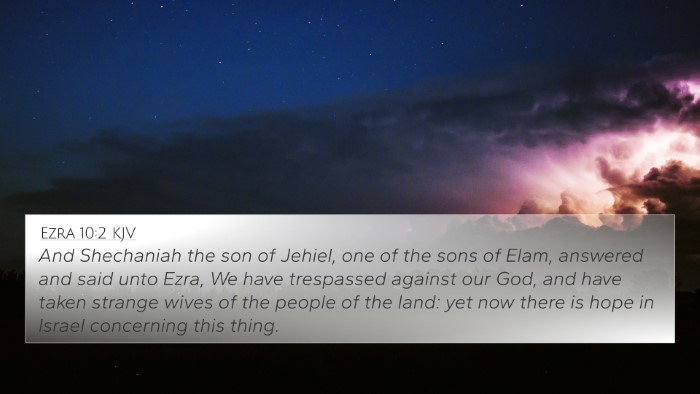
Ezra 10:2 (KJV) »
And Shechaniah the son of Jehiel, one of the sons of Elam, answered and said unto Ezra, We have trespassed against our God, and have taken strange wives of the people of the land: yet now there is hope in Israel concerning this thing.
Malachi 2:11 Verse Analysis and Similar Verses
Understanding Malachi 2:11
Malachi 2:11 states: "Judah has dealt treacherously, and an abomination has been committed in Israel and in Jerusalem; for Judah has profaned the sanctuary of the LORD which He loves, and has married the daughter of a foreign god."
This verse captures a pivotal moment in the prophetic message delivered by Malachi, addressing the spiritual decline and moral corruption among the people of Judah. The implications of this verse can be understood through a combination of insights from various public domain commentaries.
Context and Analysis
The context of Malachi is crucial for understanding its message. It emerges during a time when the Jewish people had returned from Babylonian Exile, and the temple was rebuilt. However, spiritual apathy and unfaithfulness marked their relationship with God.
Insights from Matthew Henry
Matthew Henry emphasizes that the treachery mentioned is a violation of the covenant obligations that the Israelites bore as God's chosen people. He notes that the "daughter of a foreign god" refers to intermarriage with pagan nations, which was strictly forbidden in the Law of Moses (Deuteronomy 7:3-4). This act not only dilutes their faith but also leads them away from the worship of the true God.
Insights from Albert Barnes
Albert Barnes highlights the seriousness of the offense committed by Judah, referring to the sanctity of the temple and its services. He connects the profanation of God's sanctuary with the covenant loyalty of the people, suggesting that such actions effectively break their bond with God. Barnes also notes the consequences of embracing foreign practices, which would lead to spiritual corruption and judgment.
Insights from Adam Clarke
Adam Clarke takes a more historical lens, describing the socio-religious context of intermarrying with foreign nations and the implications it had on the Israelite culture. He points out that the "abomination" referenced was not merely cultural but was an affront to God’s holiness, indicating how seriously God views the purity of worship among His people.
Thematic Connections
This verse relates to multiple themes prevalent throughout Scripture, emphasizing the destructive nature of unfaithfulness and idolatry.
- Idolatry & Unfaithfulness: Malachi’s lament echoes the warnings found in Exodus 34:15-16 and Deuteronomy 7:3-4, emphasizing that intermarriage leads to the worship of false gods.
- God’s Sanctuary: The profaning of the sanctuary connects to Leviticus 10:1-3, where punishment follows disrespect towards God’s holiness.
- Divine Judgment: This theme of judgment for unfaithfulness is also echoed in Jeremiah 7:30-34, where God expresses His anger over the people’s apostasy.
- The Covenant: The importance of maintaining covenant fidelity is outlined in Malachi 2:14, where God reminds them of the covenant with their ancestors.
- Faithful Remnant: Isiah 1:9 reflects the idea of a faithful remnant that God preserves despite widespread unfaithfulness.
- Consequences of Sin: Similar sentiments are found in Numbers 25:1-3, where the Israelites' sin leads to dire consequences.
- Emotional Responses of God: Such actions evoke God's sorrow, akin to Jeremiah 3:6-10, where God laments Israel’s infidelity.
Cross-Referenced Verses
To further grasp the depth of Malachi 2:11, consider the following cross-referenced verses:
- Exodus 34:15-16: Warns against intermarriage leading to idolatry.
- Deuteronomy 7:3-4: Commandment against marrying foreign women.
- Jeremiah 7:30-34: God expresses anger over idolatry.
- Numbers 25:1-3: The sin of intermarriage leading to God’s wrath.
- Isaiah 1:9: The concept of a faithful remnant.
- Ezekiel 16:30-34: Metaphorical language expressing spiritual unfaithfulness.
- 1 Corinthians 15:33: "Evil company corrupts good habits," reflecting on the impact of associations.
Application and Reflection
The implications of Malachi 2:11 go beyond its historical and cultural context. It invites contemporary readers to reflect on their own commitments and relationships. Just as Judah was admonished for their unfaithfulness, believers today are called to evaluate the influences in their lives and maintain their devotion to God.
Through thematic Bible verse connections and scriptural cross-referencing, readers can draw parallels to their own lives and identify the importance of faithfulness. It challenges believers to consider how their relationships—both spiritual and personal—align with God’s directives and how they can remain true to their faith amidst cultural pressures.
Conclusion
Malachi 2:11 serves as a stern reminder that covenant faithfulness is paramount in the life of a believer. By integrating insights from esteemed commentaries and making connections across the biblical narrative, we deepen our understanding of God's expectations and the serious consequences that follow disobedience. For those engaging in Bible cross-reference guides or tools for Bible cross-referencing, this verse and its commentary provide rich material for study and application.


